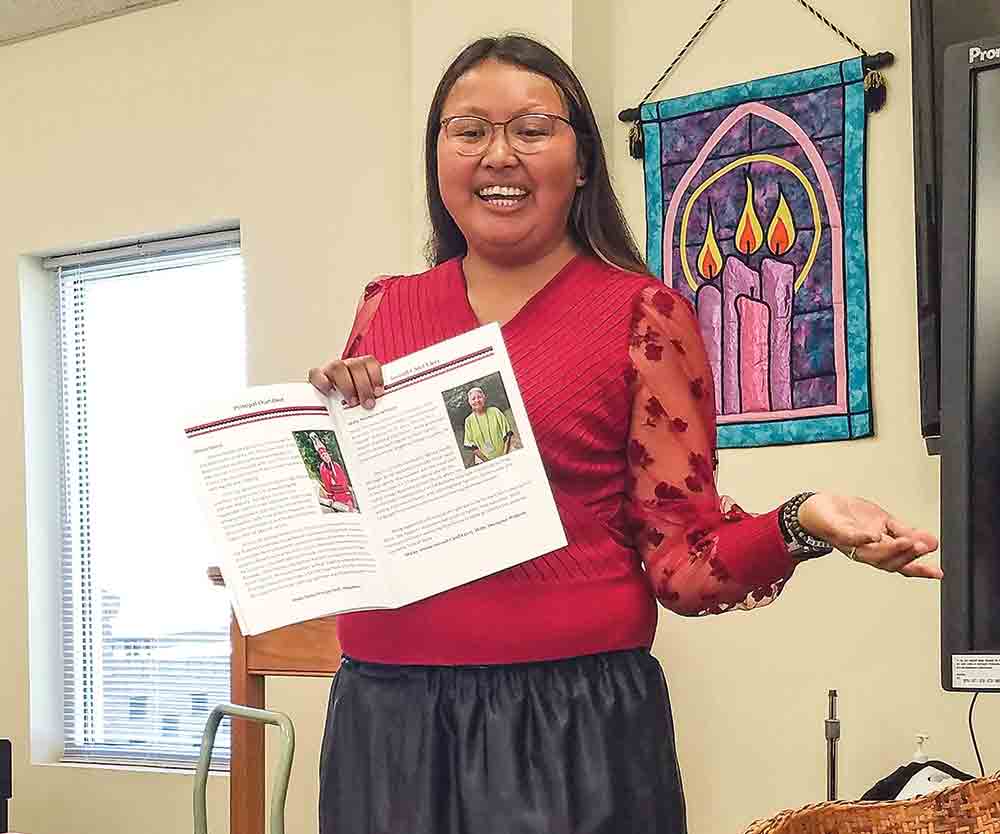AAUW learns about Alabama- Coushatta Tribe of Texas
 Debrina Sylestine Dirden recently spoke at the AAUW about the history of the tribe and what it means for a tribe to be federally recognized. Photo by Emily Banks Wooten
Debrina Sylestine Dirden recently spoke at the AAUW about the history of the tribe and what it means for a tribe to be federally recognized. Photo by Emily Banks Wooten
By Emily Banks Wooten
This email address is being protected from spambots. You need JavaScript enabled to view it.
Debrina Sylestine Dirden, communications director for the Alabama-Coushatta Tribe of Texas, recently provided a program for the Polk County Branch of American Association of University Women (AAUW).
Dirden began by giving a brief history of the tribe.
“The Alabama-Coushatta Tribe of Texas has the oldest reservation in the state, located on approximately 10,200 acres in the Big Thicket of deep East Texas. The tribe is a fully functioning sovereign government with a full array of health and human services, as well as law enforcement and emergency services.
“There are more than 1,400 members, about half of whom live on the reservation. The tribe is governed by an elected tribal council and advised by a principal chief and second chief. Although they were two separate tribes, the Alabamas and Coushattas have been closely associated throughout their history. The tribes lived in adjacent areas in what is now the state of Alabama. By 1780, the tribes had been forced to modern-day East Texas. Their cultures have some differences but for the most part, are nearly identical.
Related Articles
Dirden then explained what it means to be a federally recognized Indian Tribe.
“Federally recognized tribes are acknowledged as having natural inherent rights to self-government (tribal sovereignty) and are entitled to certain federal benefits, services and protections because of the special trust relationship. The United States recognizes the right of these tribes to self-government and supports their tribal sovereignty and self-determination. These tribes possess the right to establish the legal requirements for membership. They may form their own government, enforce laws (both civil and criminal), tax, license and regulate activities, zone and exclude people from tribal lands.
Dirden explained that those who serve on the tribal council are elected to three-year terms and that for the first time in history, there are more women than men on the tribal council.
She said the principal chief is Mikko Kanicu Donnis Battise and that is a lifetime role. The second chief is Mikko Poliika Istaaya Millie Thompson Williams who is the first woman to ever serve in this capacity. Members of the tribe voted Sept. 14. To vote, one has to be a tribal member 18 or older. Williams was inaugurated on Jan. 1.
Dirden showed several pine needle baskets made from long-leaf pine needles wrapped in raffia and some handmade river cane baskets. She also showed some elaborate beadwork, including the beaded crown she wore when she served as tribal princess in 2009-2010.
She also told the story of a man who was traveling to Beaumont in the late 1800s for a Presbyterian meeting and got lost in the Big Thicket. Tribal members came to his rescue and guided him and he was so grateful that he later came back and established the Indian Presbyterian Church, the oldest church on the reservation.
You are a guest
or post as a guest
Be the first to comment.

